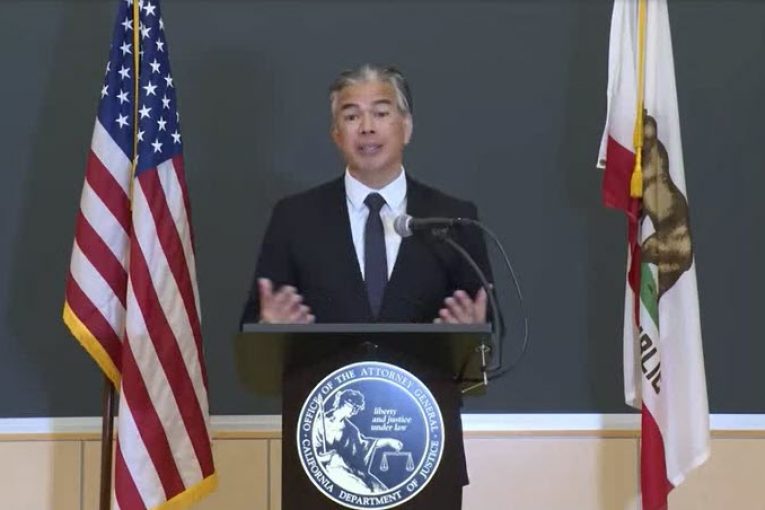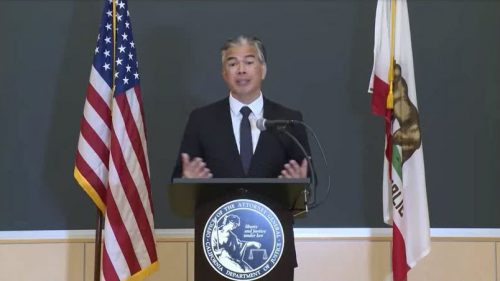

By Sarah Chayet and Quinn Hogan
FONTANA, CA – California Attorney General Rob Bonta has released a report analyzing the events surrounding the death of Travis Tarrants, who was shot by Fontana Police Department (FPD) officers in April of 2022.
According to a California Department of Justice (DOJ) statement, the DOJ will not file criminal charges against FPD officers involved in the shooting.
According to the AB 1506-mandated report, Tarrants was shot and killed on April 7, 2022, by multiple FPD officers near a Wendy’s in Fontana, CA, where he had fled after allegedly robbing a nearby bank.
The report indicates he was shot after he allegedly pointed a weapon at officers. The weapon was later found to be a modified airsoft pistol.
The DOJ press release states that “the evidence does not show, beyond a reasonable doubt, that the deputy involved acted without the intent to defend himself and others from what he reasonably believed to be imminent death or serious bodily injury.”
The official report supports this finding with testimony from the officers involved in the shooting.
According to the report, all of the involved officers believed Tarrants was armed with a firearm when they opened fire, and “acted in lawful defense of self and defense of others.”
According to the report, there were five shooting officers: Officer Jacinto DeLeon, Officer Sein, Officer Doakes, Officer Gossert, and Officer Nassar. The two witness officers were Sergeant Lally and Officer Mudder.
The report also includes a section for civilian witnesses, one of whom was Tarrants’ father. The report added, “Approximately one month before the bank robbery in Indiana, Mr. Tarrants and his father were (allegedly) involved in an argument where Mr. Tarrants told his father he was going to commit ‘suicide by cop.’”
The DOJ credited the report to AB 1506, which outlines protocol for information surrounding officer-involved shootings; certain information must be made public if criminal charges are not pursued. AB 1506 requires the DOJ to investigate officer-involved shooting deaths of unarmed people in California.
Attorney General Bonta said of the report, “AB 1506 is a critical transparency and accountability tool, and our hope for this report is to provide some understanding and aid in advancing towards a safer California for all. Loss of life is always a tragedy. We acknowledge that this incident posed challenges for all parties involved, including Mr. Tarrants’ family, law enforcement, and the community.”
The second half of the DOJ news release details five policy recommendations made to the FPD that are intended to prevent something similar from happening again. First, the DOJ recommends that the FPD establish an official policy pertaining to how and when officers assume and transfer command and control of a scene.
The DOJ also recommends that the FPD modify its policy to include a list of tactics for de-escalation that officers could employ. Among the recommended tactics listed are “verbal persuasion,” “warnings and advisements,” and “the use of other resources, such as crisis intervention teams.”
The DOJ release also suggests that the FPD should develop another specific policy, “regarding situational and positional awareness of officers when repositioning and during an encounter, particularly encounters with subjects who are thought to be armed.”
The news release calls the FPD’s current policies on body worn cameras “conflicting,” and recommends “FDP revise its policy to ensure it does not contain inconsistent direction and instead provides clear guidelines to the officers on when they should activate their body worn cameras.”
According to the DOJ, any new or revised body worn camera policy should clearly indicate the circumstances under which it is acceptable for officers to mute the audio or video recording function of their cameras, and that the policy should require officers to clearly state their justification for muting or turning off their cameras before they do.
Finally, the DOJ recommends FPD update its manual to include up-to-date policies and “conspicuously post” its manual online, as it is against the law not to do so.